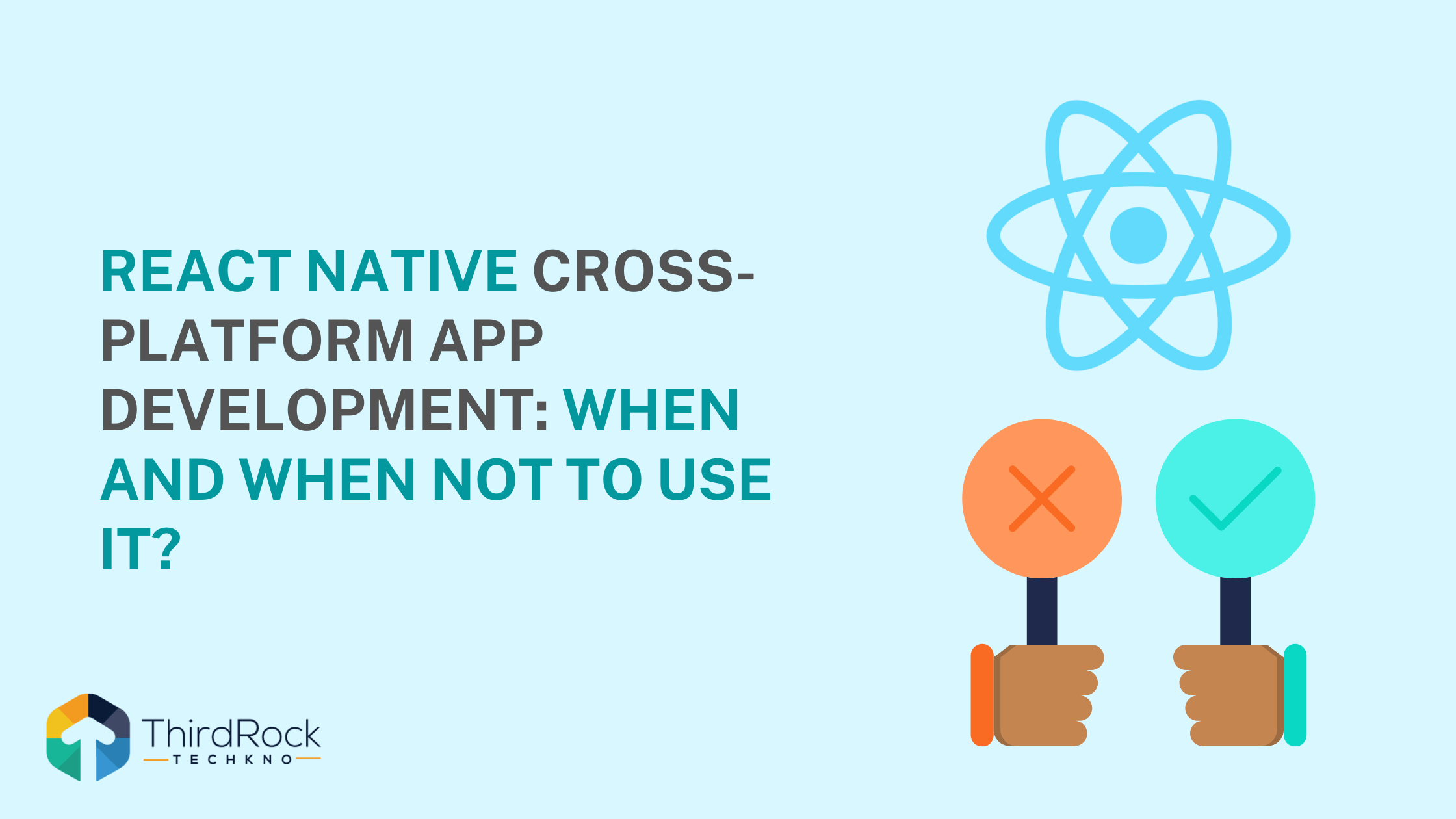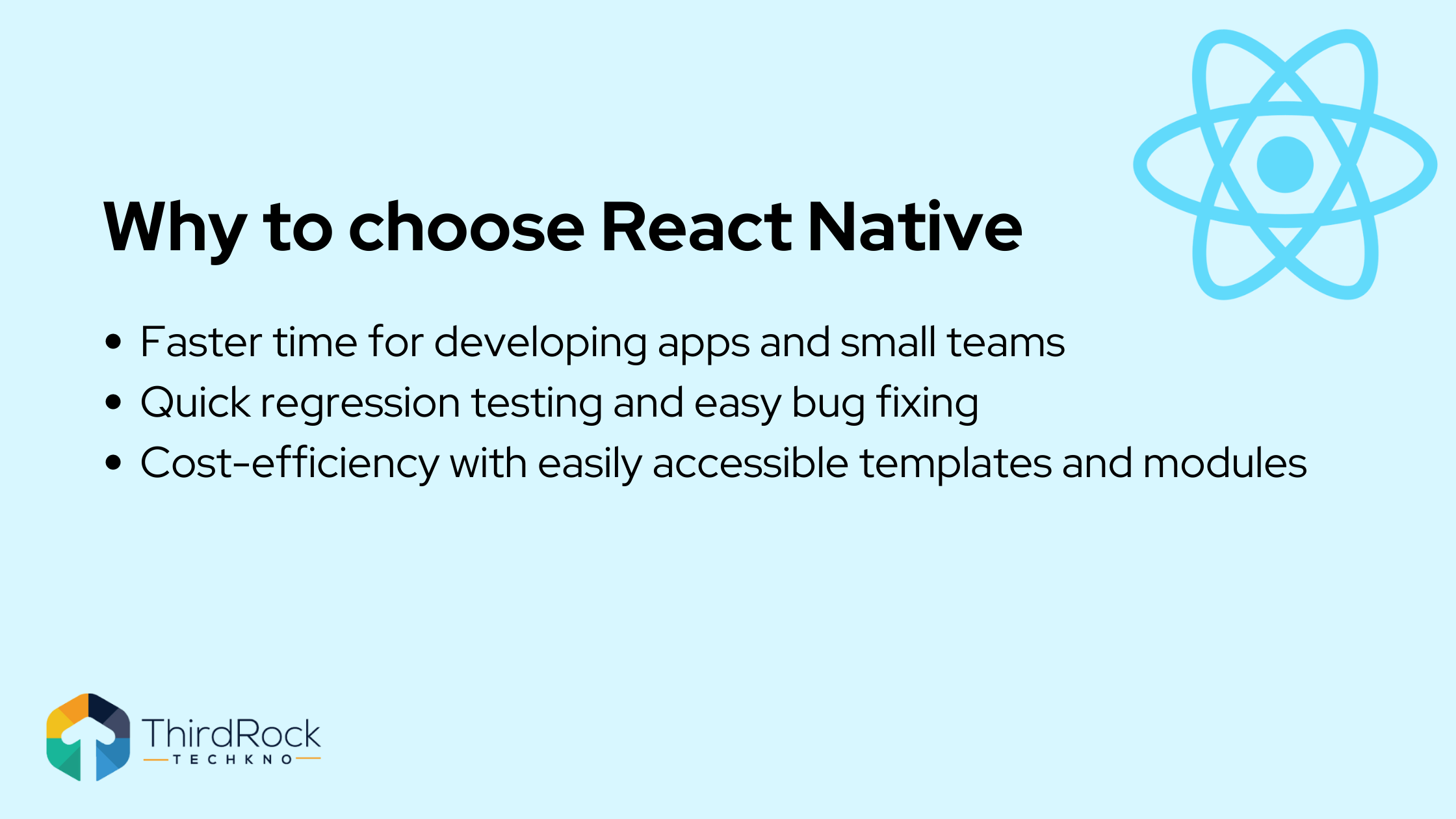
Native apps have steered the app development industry with their high performance, excellent appeal, and powerful platform-specific features. However, the emergence of cross-platform app development tools left the business owners and managers in a fit - to launch or not to launch their products on several platforms simultaneously.
Table of Contents
So, the heated debate arises - can cross-platform substitute the native apps with the same look and feel of native apps? React Native came pretty close to ending that debate with its capability of taking native blocks for the UI to assemble them with ReactJS.
When Facebook developed the React Native framework for mobile app development, a JavaScript library, they made sure to define its main point of selling as cross-platform apps. React Native at R is an introduction to their fruitful efforts. React Native also gives the option of embedding custom native code combined with a mixture of React and native. Since then, stalwarts like Airbnb and Shopify have implemented React Native’s prowess in their own ways. And they both have opposite views of using React Native.
Keep reading ahead why and when React Native could be an ideal choice and where it would be less than ideal.
Also Read: Is React Native the Right Choice for Your Business?
Why Use React Native for Mobile App Development and When it is an Excellent Choice?
React Native brought a significant iteration with cross-platform app development. Instead of writing two separate codes, code sharing between Apple and Android remains a considerable benefit. Further, it makes it highly convenient to reuse the parts of a web app, and using React Native Web even allows developers to share code across all three venues. Faster app updates and no need to go through the review process for apps almost seal the deal. Instead, developers can make OTA (Over the Air) updates with Expo or CodePush, except when updating native code.
Cutting Down Development Speed and Costs

The theoretical and practical sides of React Native development have two different approaches. The theoretical side defines the ease with which developers write the code once, leaving the job of creating cross-platform-specific versions for React Native. The practical side defines that even though there are imperfections while translating between operating systems, it shares a great deal of codebase across platforms.
Consequently, it helps developers in cutting down the speed of developing an app to almost half, supporting multiple platforms simultaneously. Moreover, with a web app, React Native can use a huge chunk of that code, resulting in shortening the timelines.
Consequently, it helps developers in cutting down the speed of developing an app to almost half, supporting multiple platforms simultaneously. Moreover, with a web app, React Native can use a huge chunk of that code, resulting in shortening the timelines.

Increasing Developer Productivity

React Native works wonders for organizations that want to hire a single developer to build an app for both mobile and web. As a subset of React, React Native allows you to build an app with the same user interface for both mobile and web platforms. As long as you don’t want to use any modules with typical native functions, firms can increase their productivity and reduce React Native app development costs. Thus, the overall app development experience goes through a massive transformation with React Native.
Shopify was one of the early adopters that went full throttle by switching to React Native. They also discovered that their team was twice as productive with React Native compared to the native development of their Arrive app.
React Native Supports Many Native Components
Native apps are more potent than hybrid ones in all aspects related to native behavior like navigation and increased accessibility to functions. Even though it's easier to develop an app for multiple platforms, it won't be perfect. You might need to make a few modifications in the native code, and modules might behave differently. But if you are aiming towards a simple app that only retrieves and shows data, you would face little issues in running the same code across all platforms.
React Native Shows its Potential When Developing MVPs

MVP – Minimum Viable Product is not a prototype or a product mockup. It’s the most basic form with a few necessary functions that you can showcase on the market for your customers. MVPs also form the foundation for a much bigger app in the future. The scalability of the app could also create challenges with the framework. Hence, choose React Native to build an MVP ONLY when you are sure it would not require further development. The Hot Reload function allows you to maintain the state of your app, which is a significant part when developing an MVP or getting started with a new app.
9 Ways Building An MVP With React Native Helps Startups
Read More
For Optimizing Single-page Applications (SPAs)
SEO is an essential component to aid an app’s search engine visibility. It also provides enough scope to deal with certain drawbacks of SPAs, like challenges in running JS code and no dynamic SEO tags. React Native has an intriguing feature, Isomorphic React Integration, that assists brands in optimizing SPAs for SEO. It’s a web application that enables firms to benefit from server-side rendering and SPAs. It allows the app to identify automatic support for JavaScript. Further, React Native developers also assist in indexing the websites as efficiently as HTML ones.
When You Need a Supportive Developers’ Community
React Native consists of a thriving community of developers for sharing their experiences, offering practical advice and tutorials. Equipped with a vast library of native components like API, navigation, and fancy vector animations, it keeps on expanding itself every day. JavaScript being the most popular language these days enables the developers to learn React Native quickly. Even if new developers may run across some challenges, the developers’ community ensures to solve each issue with a dedicated tutorial or experiences.
Now that we have covered all the scenarios where React Native is an ideal choice, let us head to the part where we explain the instances where the React Native won’t be feasible to pave your road to success.
Also Read: Mistakes to Avoid When Developing React Native Apps

When is React Native NOT a Good Choice?
Earlier in 2021, Facebook announced that Facebook Messenger would release as native apps on Android and Apple. Similarly, in 2018, Airbnb and Udacity also expressed that they would not deploy or hire React Native developers for building their apps further. It extensively threw light on the drawbacks against the significant benefits of React Native.
The following are some crucial instances where React Native might not be ideal:
Apps with High Demand for Designs
Native apps indeed take the cake by delivering the highest performance with design-heavy functions. However, complex designs and extensive interactions aren’t necessary to attract purchases from users. In this case, you might have to spend money on two native developers, probably a designer, and a lot of time to deliver the best user experience.
Apps with Animations
React Native app development service helps developers create brilliant native experiences with JavaScript code for interaction with native components. The mechanism is the Bridge, which can also create some hindrances while building animations. The open-source nature of React Native allows itself to improve constantly, with third parties building solutions for everyone’s benefit. On the other hand, Facebook is also busy bringing changes in the performance of Bridge. However, you would need a person to curate animations – and it won’t be cheap or quick.
Apps Built With React Native Will Always be Different from Native Apps
React Native app development service might have the name “native,” but it only mimics the native apps. Developers who have the expertise, experience, and skills to develop native apps can quickly tell the differences in apps created with React Native. App stores also hesitate to accept hybrid apps, as the launch process of a cross-platform app comes with more complexities and longer spans.
Apps Needing A Lot of Computational Power
Small and simple apps don’t require many user interactions, however, building a large app requiring computational power from your smartphone, the performance might take a hit. For example, a stock trading app would require you to offload some heavy operations from the native part of the app. Since users expect an app to load under 4 seconds, according to a Tech Beacon survey, it's not affordable for a firm to push an app to app stores with long loading times.
Conclusion
Choosing a React Native app development company will make sense if your organization is in search of:
Faster time for developing apps and small teams
Quick regression testing and easy bug fixing
Cost-efficiency with easily accessible templates and modules

Apart from app performance, development cost, and speed, the app's complexity is significant to consider when choosing React Native. Apps with high complexities are likely to suffer performance issues; hence, React Native wouldn’t suffice in this case. On the other hand, if an app is less complex and is a collection of articles, list views, chat, React Native delivers decent performance.
For large-sized companies and enterprises, maintaining two development teams is quite feasible. However, for smaller companies, React Native enables them to have a presence across all platforms – Android, Apple, and Windows – which is exceptionally essential. In the end, it all depends on the needs, requirements, abilities, and feasibility of a firm when deciding to select an app development framework. At Third Rock Techkno, our expert developers know how to tackle each situation and adapt accordingly. You can also contact our expert consultants to plan out a detailed app development strategy.
Build World-Class Software at Competitive Rates
We prioritize value over cost. Our industry experts both in the US and in India ensure your unique software needs are met while also maximizing the ROI.
Get free cost estimation for your project

